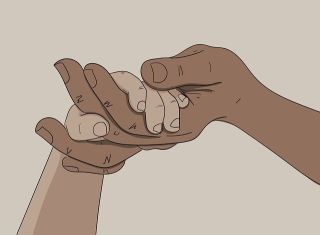Relationships
Social Mindfulness, "Vitamin S," and Well-Being
The many benefits of pro-sociality.
Posted June 20, 2023 Reviewed by Abigail Fagan
Key points
- Social mindfulness refers to being considerate of others and their needs before making decisions.
- Connection and Vitamin S (sociality) is essential for our well-being.
- We often form our judgments of others based on their warmth, integrity, and competence.
In most recipes for leading healthy and happy lives, the center stage is reserved for our close relationships. Often, however, it’s the moments of connection with complete strangers that add distinct sweetness to our days. Someone helping us look for our lost keys; someone offering us a sincere compliment; someone not buying the last apple cake in case we wanted it more.
This flavor of active pro-sociality — being considerate of others and their needs, before making decisions — is referred to as social mindfulness. Like with Emerson’s image of happiness as a perfume whose droplets inevitably spill on the person who pours it onto others, the rewards of kindness are all-embracing. Doing good nourishes the well-being of the givers, the receivers, and even the witnesses of the kind acts.
As Danusha Laméris considers in her poem Small Kindnesses, perhaps these socially mindful exchanges we have with each other are even more important than we realize:
What if they are the true dwelling of the holy, these
fleeting temples we make together when we say, “Here,
have my seat,” “Go ahead — you first,” “I like your hat.”
Psychologist Paul van Lange has been investigating social mindfulness for over a decade. His research has yielded fascinating insights. For example, people in Japan are among the most socially mindful in the world; despite its unwholesome nature, gossip can serve a protective function for groups; and kindness is a key that opens a myriad of possibilities. “When we are sitting in our comfortable apartments, it can be tempting for us to stay there,” he says. “But by simply going outside, we are stepping into a world of opportunity to experience connection.”
Here’s Dr. van Lange on human connection.

MP: Why is connection so essential for our well-being?
PVL: Simply put, we need each other for survival and reproduction. The next broadest motive for human connection is to satisfy our universal, psychological need for relatedness: we experience a sense of belonging, and thus, we don’t feel like we are alone. Even the smallest forms of human connection, like the exchange of genuine smiles between people, can impact our well-being.
For example, when I’m traveling, there are days when my only interaction is with the people in coffee shops who sell me coffee. I make an intentional point to connect with them by asking a question or making a comment. Initiating a conversation takes a combination of kindness and curiosity. It’s a well-intended and natural way of showing interest in another person. Connection begins before we say anything — perhaps through a smile, extended eye contact or an attitude of openness that you share with the other person.
When I return to the coffee shop the next day, the people recognize me and greet me with a smile. Research shows that these seemingly small tokens of connection matter more than we imagine. They can even give us a temporary boost in happiness. I call these benefits of sociality "Vitamin S."
MP: Is there an optimal dose of Vitamin S we need to maintain our well-being?
PVL: The right dosage of Vitamin S will be different for each of us. I have a hypothesis that conversations not only positively affect the quality of our lives, but also our life expectancy. The exchange of energy between interlocutors keeps us mentally young. Our emotional and cognitive systems become active — not only as speakers, but also as listeners. It’s a form of brain training. But the art of conversation is a mentally straining activity. As we converse, we are processing a wealth of information while attending to our reputational concerns. Thus, even the most enjoyable conversations can take a toll after a while. Ultimately, we must discern for ourselves how much Vitamin S is optimal for our current needs. When it comes to connection, however, I believe that lack is more detrimental than excess. Having too much Vitamin S can be easily regulated by taking some time alone to recharge our social batteries. But since the telltale signs of having too little Vitamin S are more subtle, my recommendation is to have at least some kind of interaction every day.
MP: Why are we sometimes able to form deep connections with strangers we just met?
PVL: One of the most significant immaterial concerns that people have is their reputation. Interestingly, our wish to protect our reputation can help us form connections with strangers. Let’s say you meet somebody on a plane and have a surprisingly deep conversation. The reason why we sometimes form heartfelt connections with strangers is not only because we decide that, for whatever reason, we like the person next to us, despite knowing very little about them. But also, because there’s an in-built trust between us — we know that this person cannot talk to others we may know. Thus, we might feel safe to share personal information with each other, because it won’t affect our reputation with the people in our lives.
Furthermore, with a stranger, we usually don’t have strong differences in power or status which we might experience with our closer ties. This trust, self-disclosure, and lack of conflict of interest, in turn, can facilitate genuine connections with other human beings — even if we just happened to have met them.
MP: What corrodes human connection and what helps it flourish?
PVL: Thoughtfulness, benevolence, not being too self-focused, curiosity, honesty — these are facilitators of human connection. On the other hand, any violation of trust, as well as ill-willed insults that intentionally degrade the other person harm relations.
MP: In a given interaction, what informs our impression of others? How do we decide whether or not to like and trust someone?
PVL: Research on social perception shows that there are a few fundamental dimensions on which we base our judgments of others. The first thing we look at is the dimension of warmth. Warmth includes the intentions the person has towards us, how open they are with us, how much they appreciate us. It has a heart-driven quality to it.
The second social dimension is integrity. This is a morality-driven dimension and includes considerations such as: How honest is the person? How well do they adhere to rules of interpersonal conduct? How principled are they about not harming anyone?
The third dimension is competence, which is often linked to the person’s relative status and their ability to achieve their intentions. If we deem someone to be high on competence, we can have trust in them to get things done. All of these evaluations occur during the first few seconds of an interaction. Humans are particularly skilled at picking up signals of warmth very quickly.
Many thanks to Paul van Lange for his time and insights. Dr. van Lange is Professor of Social Psychology at VrijeUniversiteit, Amsterdam.
References
Van Doesum, N. J., Murphy, R. O., Gallucci, M., Aharonov-Majar, E., Athenstaedt, U., … Van Lange, P. A. M. (2021). Social mindfulness and prosociality vary across the globe. Proceedings of the National Academy of Sciences. 118(35), e2023846118. https://doi.org/10.1073/pnas.2023846118
Pressman, S. D., Kraft, T. L., & Cross, M. P. (2015). It’s good to do good and receive good: The impact of a ‘pay it forward’ style kindness intervention on giver and receiver well-being. The Journal of Positive Psychology, 10(4), 293-302.
Haidt, J. (2000). The Positive emotion of elevation. Prevention & Treatment, Volume 3, Article 3, American Psychological Association.




